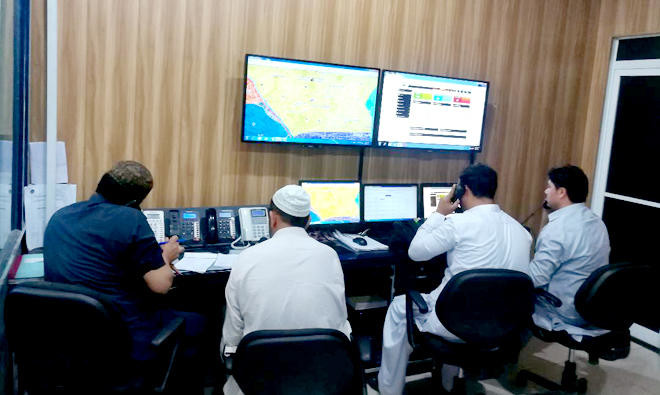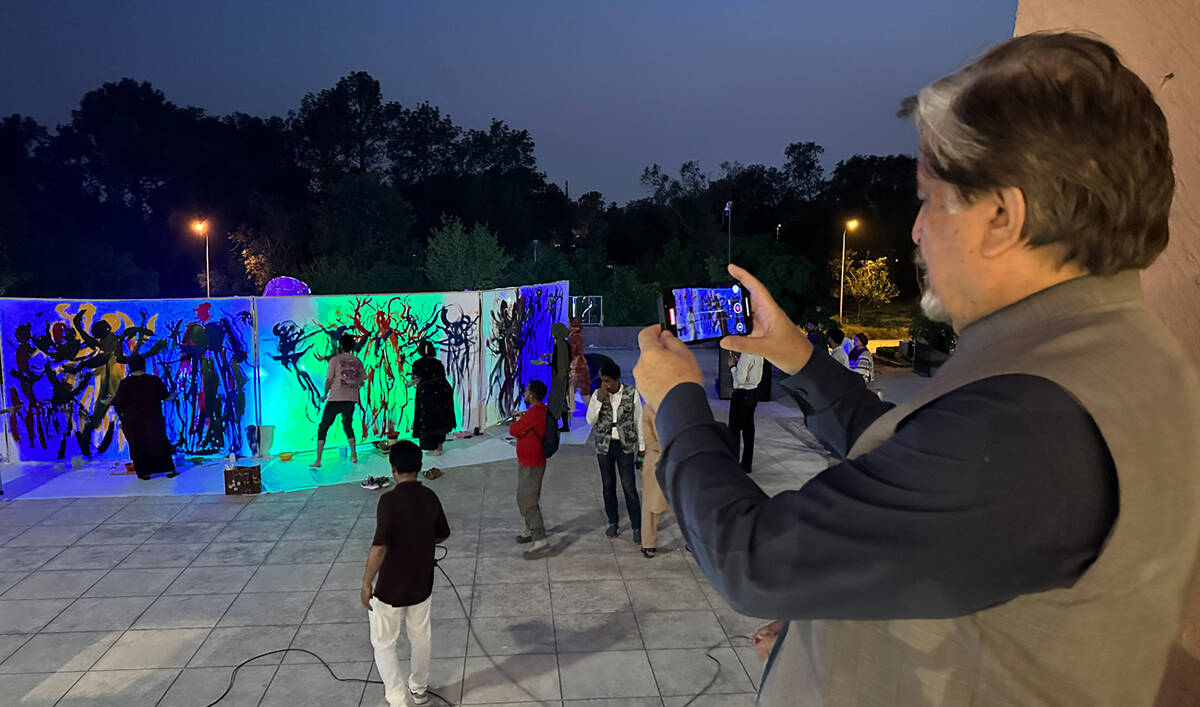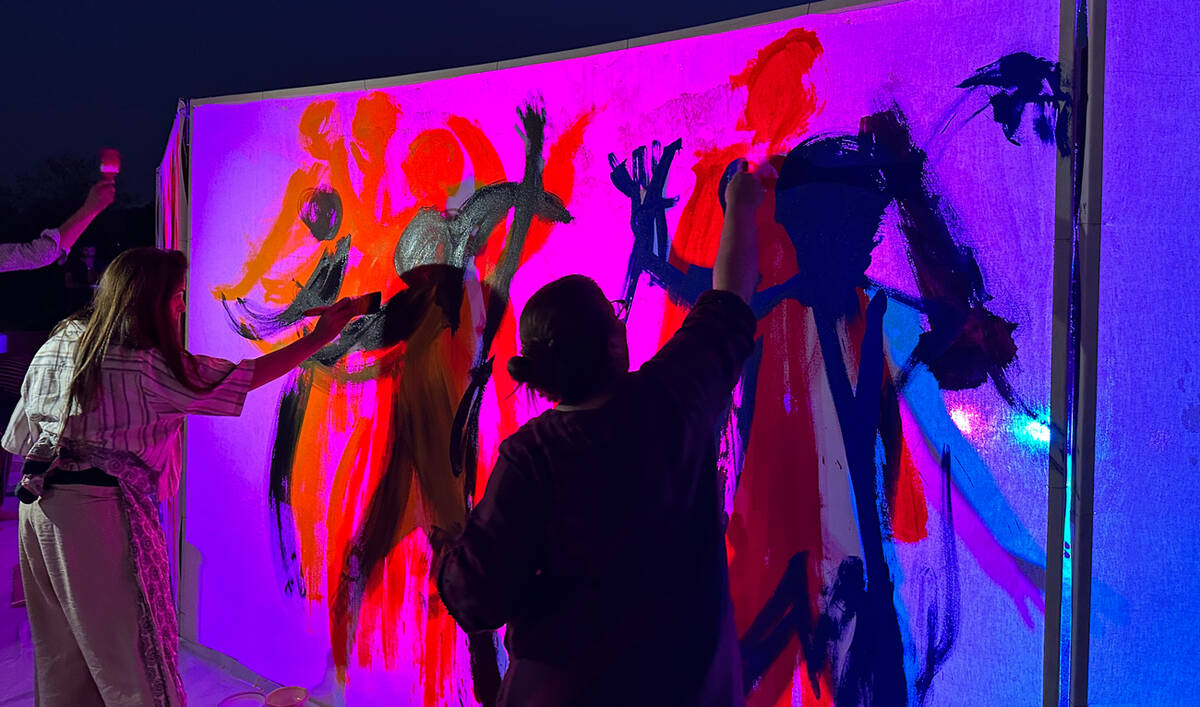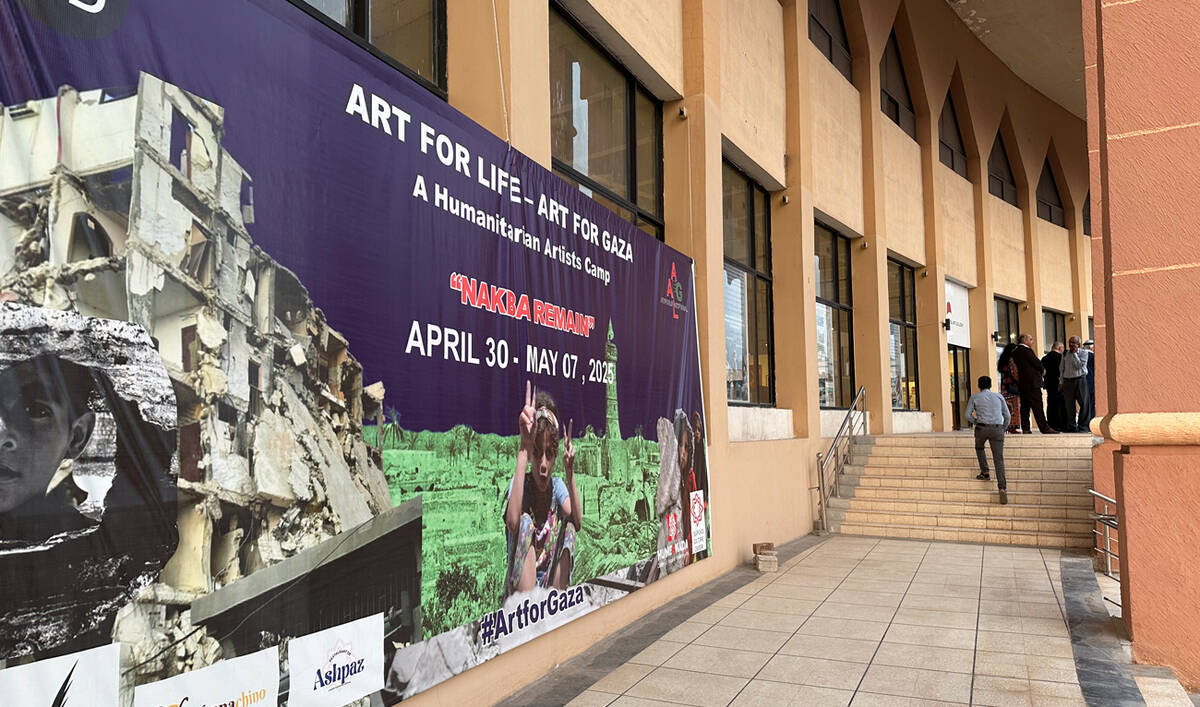PESHAWAR: Since the launch of Khyber Pakhtunkhwa police’s Android app on March 22, the law enforcement agency has received 164 public “complaints,” or calls, said Muhammad Imran, who helps to manage the app’s backend operations, on Saturday. Out of all those calls, he added, 127 were sent to the relevant police stations while 37 were still pending.
The app was launched to bridge the gap between police officials and the residents of the province. It’s available on the department’s website, and people can use it on their smartphones to report crimes and road accidents.
Superintendent Police (SP) Peshawar City Shahzada Kokab Farooq said the app had significantly improved the response time of his department.
“Depending upon the success of this app in Peshawar, we may also introduce it in other districts,” he added.
Farooq said: “It is much easier to manage 40 complaints that arrive through this app than handle 20 people who physically visit police stations with their grievances.”
The KP police have also set up a control room to deal with the public complaints arriving digitally. It consists of two big plasma screens, several computers, telephone lines and is managed by four staff members.
Imran, the control room operator, said that the app gave each complaint or report a unique ID.
“We copy the ID from one plasma screen and paste it in the search box of a map in the other. This highlights the area where the complaint or report has originated. It also reveals the contact number of the sender,” he added.
After this step, he said, the control room operators need to mark these complaints to the station house officer of the relevant police station, who directly receives the report.
Assistant Director at the Data Analysis Wing of the city’s police lines, Asfandyar Khan, told Arab News there were eight staff members managing the Android app. “Four of them receive public complaints in the control room,” he said. “The other four work in the data analysis section to monitor the process and get feedback from relevant police stations on the digitally received complaints.”
E-policing gradually takes off in Khyber Pakhtunkhwa
E-policing gradually takes off in Khyber Pakhtunkhwa

Pakistan says India sending drones to detect location of weapons system, 77 shot down

- India and Pakistan have since Thursday accused each other of carrying out waves of drone attacks
- India has targeted cities in Pakistan’s mainland provinces for first since their full-scale war in 1971
ISLAMABAD: Defense Minister Khawaja Asif said on Friday a wave of drone attacks launched by India this week was aimed at detecting the location of Pakistani weapons systems, as PTV state television reported that 77 drones had been shot down.
India and Pakistan have since Thursday accused each other of carrying out waves of drone attacks in the worst confrontation between the nuclear-armed South Asian neighbors in nearly three decades.
Pakistan’s army said it shot down 29 Indian drones on Thursday while New Delhi accused Islamabad of launching overnight raids with “drones and missiles” and claimed it destroyed an air defense system in Lahore, which Islamabad denied.
“Pakistani forces have destroyed a total of 77 Indian drones,” Pakistan Television reported on Friday.
“By the evening of May 8, 29 Indian drones had been shot down, while another 48 drones had been destroyed between last night [Thursday] and today [Friday].”
The fighting comes two weeks after New Delhi blamed Islamabad for backing an April 22 militant attack in which 26 were killed at the Pahalgam tourist site on the Indian-administered side of disputed Kashmir. Pakistan has denied involvement. On Wednesday, India said it had struck “terrorist camps” at nine sites inside Pakistan. Islamabad vowed retaliation and said it had shot down five Indian fighter jets.
The longstanding rivals have fought multiple wars over the disputed Kashmir valley since they were carved out of the sub-continent at the end of British rule in 1947. But while the conflict has been confined in recent decades mostly to the mountainous region of Kashmir, which both nations claim in full but rule in part, the air strikes on Wednesday morning, which also hit the towns of Bahawalpur and Muridke in the country’s largest and most populous province of Punjab, and the drone incursions into some of the country’s largest cities on Thursday, were seen in Islamabad as a major escalation.
One drone was shot down over the garrison city of Rawalpindi, home to the Pakistan army’s heavily fortified headquarters. Another hit a military target near Lahore, the capital and largest city of the province of Punjab, and the second-largest city in Pakistan after Karachi. The army said four military personnel were injured in that attack.
Other places where drones were neutralized were Gujranwala, Chakwal, Attock, Bahawalpur, Miano, Chor and near Karachi, which is the country’s largest city and commercial capital.
The drone attacks have raised questions about how the drones were able to get so far inside Pakistan’s airspace.
Speaking in parliament, Defense Minister Khawaja Asif said the Indian drone attacks were launched to detect the location of Pakistani defense systems.
“That is why they weren’t intercepted, so that our locations are not leaked or located. When they came down to a safe limit, we shot them down,” Asif said.

Air defense officials have backed this version, with one saying, on condition of anonymity, that the drones were mounted with Electronic Support Measures (ESMs), a technology for passive collection and interpretation of electromagnetic signals, such as e.g. radar pulses. Two or more coordinated ESM sensors can use information to geolocate the emitting radar.
“Their purpose is to detect radiations of ground-based air defense systems, and through a data link transmit the location to their [Indian] command centers,” one official said, declining to be named. “Through that their [Pakistani weapons systems] locations could get disclosed.”
He said once Pakistan understood the purpose of the drones, “it was decided that we will not engage them with long-range air defense that work on missile guidance systems.”
“We decided we either have to use soft kill, that is to make them fall through jamming or if they come lower down, then we shoot them with gun weapon systems … Henceforth, when the drones reduced altitude, they were shot down with guns.”
“OFFENSIVE ACTIONS”
The Indian army said on Friday Pakistani troops had resorted to “numerous ceasefire violations” along the countries’ de-facto border in Kashmir, called the Line of Control.
“The drone attacks were effectively repulsed and a befitting reply was given to the CFVs (ceasefire violations),” the army said, adding all “nefarious designs” would be responded to with “force.”
Pakistan Information Minister Attaullah Tarar said the Indian army’s statement was “baseless and misleading,” and that Pakistan had not undertaken any “offensive actions” targeting areas within Indian-administered Kashmir or beyond the country’s border.
In Pakistani Kashmir, which is known as Azad Kashmir, officials said heavy shelling from across the border killed five civilians, including an infant, and injured 29 in the early hours of Friday.
World powers from the US to China have urged the two countries to calm tensions, and US Vice President JD Vance on Thursday reiterated the call for de-escalation.
“We want this thing to de-escalate as quickly as possible. We can’t control these countries, though,” he said in an interview on Fox News show “The Story with Martha MacCallum.”
The Saudi minister of state for foreign affairs Adel Al-Jubeir is also scheduled to visit Pakistan on Friday. Al-Jubeir was in India on Thursday and met Indian Foreign Minister Subrahmanyam Jaishankar, who said he “shared India’s perspectives on firmly countering terrorism” with him.
With inputs from Reuters
IMF board to meet today for first review of Pakistan’s $7 billion bailout

- Pakistan, which repaid or rolled over most of $26 billion foreign loans this year, expects its foreign exchange reserves to increase to $14 billion after expected inflows
- Previous programs in Pakistan ended prematurely or saw delays, but Islamabad built some trust with IMF by completing a short-term, nine-month program last year
KARACHI: The International Monetary Fund (IMF) executive board is scheduled to meet on Friday to discuss the first review of Pakistan’s $7 billion bailout program, the lender said on Thursday.
The IMF executive board is expected to sign off on a staff-level agreement that would trigger a $1 billion payout as well as Pakistan’s new $1.3 billion arrangement under a climate resilience loan program granted in March.
The development comes amid Pakistan’s efforts to boost investment amid a gradually healing macroeconomic environment after a prolonged downturn that forced Islamabad to seek external financing from friendly nations and multilateral donors.
On Thursday, the IMF shared a tentative calendar of formal meetings and seminars of its executive board on its website, with the first review of Pakistan’s loan program scheduled to take place on Friday, May 9.
“First review under the extended arrangement under the Extended Fund Facility, request for modification of performance criteria, and request for an arrangement under the Resilience and Sustainability Facility,” it read.
Debt-ridden Pakistan, which had repaid or rolled over most of the $26 billion foreign loans it had to repay this year, expects its foreign exchange reserves to increase to $14 billion by the end of next month on the back of expected realization of planned official inflows.
The South Asian country was able to build some trust with the IMF by completing a short-term, nine-month program last year. Previous loan programs in Pakistan ended prematurely or saw delays after the governments at the time faltered on meeting key conditions.
The board’s approval has most of the time been a formality after the signing of a staff-level agreement between the Washington-based lender and the authorities in Islamabad.
Pakistani artists unite in powerful show of solidarity to raise funds for Gaza

- The participants reflection on the Palestinian cause through dialogue, paintings, sculptures, theater, music and film
- Proceeds of the artworks sold at the humanitarian art camp and others up for auction will go to the Palestinian embassy
ISLAMABAD: Around 150 Pakistani artists gathered in the Pakistani capital of Islamabad to participate in a eight-day humanitarian art camp to raise funds for people affected by Israeli military offensive in Gaza, a the head of Silk Road Culture Center said this week, in a remarkable show of solidarity with the Palestinians.
The camp, “Art for Life – Art for Gaza,” brought together musicians, writers and performers from across Pakistan who presented series of multidisciplinary performances and visual art displays to raise funds for the war-torn people of Gaza.
The event began on April 30 and ended on May 7, amid renewed Israeli strikes on the Palestinian enclave. Israeli’s 18-month war against Hamas has killed more than 52,000 Palestinians, many of them women and children, Palestinian officials say.
“The idea [behind the event] was to empathize with the suffering people of Palestine,” Jamal Shah, chairman of the Silk Road Culture Center, told Arab News on Wednesday, without sharing details of the total funds raised.

A wide range of artworks, including paintings, sculptures, calligraphy, origami and mixed media, were created, exhibited and sold at the event, according to Shah. Many of the pieces are still up for auction, with proceeds pledged to the Palestinian embassy in Pakistan to support humanitarian aid efforts in Gaza.
The participating artists engaged in dialogue around the Palestinian cause and expressed their reflections through paintings, sculptures, theater, music and film at the event.
“My depiction shows their flag and different elements. The golden color represents pain and the Al-Aqsa Mosque,” said Atif Ayub, a contemprary artist from Lahore, describing his installation that combined symbolic imagery focusing on the year 1988 that marked the establishment of the State of Palestine.
“It’s all about shared humanity and emotion.”

The final two days featured live painting sessions, with artists painting silhouettes of performers in real time. These sessions were accompanied by musical performances, skits and poetry readings.
Pakistani singers and musicians such as Arieb, 360 Degrees, Maddy and Sam performed original pieces dedicated to Palestine, contributing to the emotional tone of the event.
Zeeshan Usman Khattak, a filmmaker from the northwestern city of Peshawar, said their collaborative work was a visual metaphor for the crisis in Gaza.
“There was a live performance behind the canvas and we were capturing the shadows,” Khattak said of their live performance. “Those movements reflected the dance of life and death, the aggression, the loss.”

Wednesday’s closing ceremony was attended by ambassadors from Palestine, Iraq, Iran, Sudan, Jordan, Lebanon, Morocco, Yemen, Qatar, Syria and Romania, along with cultural attachés from China and Iran as well as representatives from the French film community.
Summera Jawad, a professor who teaches fine arts at Lahore’s Punjab University, highlighted the community-driven nature of the initiative.
“Artists are not just performing or creating here, they’re also contributing to the exhibition and donating their artworks for the cause,” she said.
Pakistan says economic affairs ministry’s X account hacked amid conflict with India

- Tensions between the two neighbors have escalated into a limited-scale military conflict since India struck multiple locations in Pakistan
- Both neighbors have since fired and sent drones and missiles into each other’s airspace, leaving around four dozen people dead on both sides
ISLAMABAD: Pakistan’s ministry of economic affairs said on Friday that its X account had been hacked after a post was published on it appealing to international partners for more loans, amid a growing conflict with India.
Tensions between the two neighbors over an April 22 attack in Indian-administered Kashmir’s Pahalgam escalated into a limited-scale military conflict, when India struck on Wednesday multiple locations in Pakistan after New Delhi blamed the assault on Pakistan. Islamabad has denied involvement.
Pakistan has claimed to have shot down five Indian fighter jets and 29 Israeli-manufactured Harop drones, launched from India, in retaliation to Indian missile and drone strikes this week. India said it had destroyed an air defense system in Lahore in response to a Pakistani air attack.
It was not possible to immediately verify all of the claims made by both countries. The two arch-rivals have also accused each other of cyberattacks on their critical digital assets and infrastructure in times of peace, and Indian media reported that Indian defense websites had come under attack after the Pahalgam attack.
“We are working to have the Twitter (X) switched off,” the Pakistani economic ministry told Reuters, adding that they “did not tweet” about it.
Meanwhile, New Delhi ordered X to block over 8,000 accounts in India, subject to potential penalties including significant fines and imprisonment of the company’s local employees.
“The orders include demands to block access in India to accounts belonging to international news organizations and prominent X users,” X’s Global Government Affairs team said on its account, adding it was unable to publish the executive orders at this time due to “legal restrictions.”
“The Indian government has not specified which posts from an account have violated India’s local laws. For a significant number of accounts, we did not receive any evidence or justification to block the accounts.”
The platform said it disagreed with the Indian government’s demands, describing the blockade of accounts as “contrary to the fundamental right of free speech.”
“X is exploring all possible legal avenues available to the company,” it said. “We encourage all users who are impacted by these blocking orders to seek appropriate relief from the courts.”
US voices support for Pakistan’s call for independent probe into Kashmir attack

- The attack, which killed 26 tourists, has triggered a military conflict between Pakistan, India after New Delhi this week launched missile strikes on multiple Pakistani cities
- India is an important partner for Washington, while Pakistan remains a US ally despite its diminished importance after Washington’s withdrawal from Afghanistan in 2021
ISLAMABAD: The United States (US) supports an independent probe into an attack in Indian-administered Kashmir last month, the State Department said on Thursday, amid ongoing strikes between India and Pakistan over the April 22 assault.
New Delhi blamed the attack in Kashmir’s Pahalgam resort town on Pakistan. Islamabad denied the claim and called for a credible, international investigation to ascertain facts about the assault that killed 26 tourists. After initially exchange of diplomatic barbs, India on Wednesday conducted missile strikes in multiple Pakistani cities and killed 31 people, according to Pakistani officials.
Pakistan says it has downed five Indian fighter jets and 29 Israel-made drones, launched from India, this week in retaliation to Indian strikes. New Delhi said it destroyed a Pakistani air defense system in Lahore in response to an air attack. It was difficult to independently verify the claims made by the nuclear-armed arch-foes.
As the ongoing conflict alarmed the world powers, State Department spokesperson Tammy Bruce said the US had been engaged with both governments and urged India and Pakistan to work toward a “responsible solution” to the issue, which has led to the worst fighting between the two neighbors in decades.
“There’s a lot already on the record when it comes to our reaction to what’s been happening here,” Bruce said.
“So there’s some discussion that Pakistan wants an independent investigation as to what has happened regarding the terrorist attack, and, of course, what we say to that is we want the perpetrators to be held accountable and are supportive of any efforts to that end.”
Pakistan and India accused each other of launching drone attacks and Islamabad’s defense minister said on the second day of major clashes on Thursday that further retaliation was “increasingly certain.” Two days of fighting has killed nearly four dozen people on both sides.
India is an important partner for Washington, which aims to counter China’s rising influence, while Pakistan remains a US ally despite its diminished importance after Washington’s withdrawal from neighboring Afghanistan in 2021.
Analysts and some former officials have said the US involvement to achieve diplomatic goals in Russia’s war in Ukraine and Israel’s war in Gaza may make Washington leave India and Pakistan on their own in the early days of their tensions, without much direct pressure from the US government.
On Thursday, US Vice President JD Vance said India and Pakistan should de-escalate tensions, but he added that the US could not control the nuclear-armed neighbors and a war between them would be “none of our business.”
“We want this thing to de-escalate as quickly as possible. We can’t control these countries, though,” Vance said in an interview on Fox News.
“What we can do is try to encourage these folks to de-escalate a little bit, but we’re not going to get involved in the middle of war that’s fundamentally none of our business and has nothing to do with America’s ability to control it.”
The escalation began soon after the April 22 attack in Kashmir, reviving the decades-old rivalry between the two neighbors who have fought multiple wars, including two over Kashmir, since their independence from British rule in 1947.
“Our hope and our expectation is that this is not going to spiral into a broader regional war or, God forbid, a nuclear conflict,” Vance said.
Washington has held regular talks with both in recent days, including on Thursday when Secretary of State Marco Rubio held calls with Pakistan’s prime minister and India’s foreign minister while urging them to de-escalate and have direct dialogue.
US President Donald Trump has called rising tensions a shame and said he hoped the two countries will stop now after going “tit-for-tat.”
“This administration has made itself clear, that war, the military, more violence is not a solution,” Bruce added. “Diplomacy is a solution, new ideas to stop generational violence and problems.”














